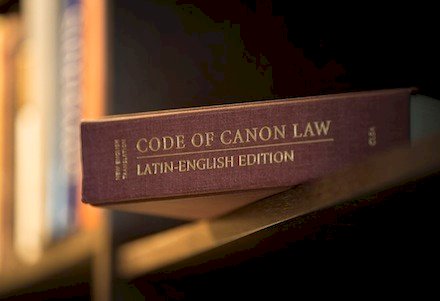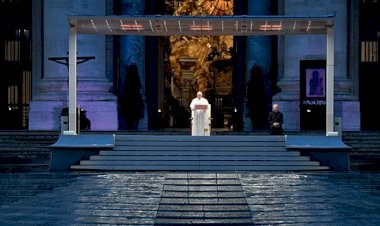Revision of Canon Law-Part VI
Begun under Pope Benedict XVI, Pope Francis approved the revised Book VI of the Code of Canon Law on the 1st June 2021, sealing loopholes in canon law, to discipline predator priests and subversives attempting to ordain women.

Pope seals canon loopholes for sexually abusive clergy and laity
Begun under Pope Benedict XVI, Pope Francis approved the revised Book VI of the Code of Canon Law on the 1st June 2021, sealing loopholes in canon law, to discipline predator priests and subversives attempting to ordain women.
Responding to the "disconcerting and very serious episodes of paedophilia" perpetrated by abusive clergy and "a climate of excessive relaxation in the application of criminal law", the revised laws make punishment for offenses an obligation, rather than a recommendation.
The apostolic constitution Pascite Gregem Dei (Shepherd the Flock of God) is aimed at "the re-establishment of the requirements of justice, the amendment of the offender and the reparation of scandals."
In addition, women's ordination has been defined as a new crime in the section on offenses against the sacraments. While the other matters were given much airing in the secular media, this issue has been given little attention, except in some catholic publications like “The Tablet”!
According to the revised canon 1379, a person attempting "to confer a sacred order on a woman, and the woman who attempts to receive the sacred order, incur a latae sententiae excommunication reserved to the Apostolic See; a cleric, moreover, may be punished by dismissal from the clerical state." Under the 1983 Code of Canon Law the same canon read: "a person who simulates the administration of a sacrament is to be punished with a just penalty."
It is considered a positive improvement to the criminal statute governing all of the world's 1.3 billion Catholics, as it plugs the lacuna legis or 'loopholes' in some issues which existed since the present Code's promulgation in 1983.
Archbishop Filippo Iannone, president of the Pontifical Council for Legislative Texts, explained how the long-overdue to be revised code, transfers the crime of sexual abuse of minors and child pornography from the section on "crimes against special obligations", to that of "crimes against the life, dignity and freedom of the person". That "re-affirms the gravity of this crime and the attention to be paid to the victims."
The original penal law of the Code of 1983 was quite weak and often not forceful enough. The new canon #1398 punishes a priest with removal from office "if he immorally acquires, retains, exhibits or distributes, in whatever manner and by whatever technology, pornographic images of minors or of persons who habitually have an imperfect use of reason."
The canon also covers grooming or inducing a minor or a person who habitually has an imperfect use of reason "to expose himself or herself pornographically or to take part in pornographic exhibitions, whether real or simulated."
These crimes are now extended by the Code also to members of institutes of consecrated life and societies of apostolic life and to lay faithful who enjoy a dignity or perform an office or a function in the Church. The original penal law of the Code of 1983 was quite weak and often not forceful enough. You could often find phrases like 'could be punished,' and the whole implementation of the text contained in Book VI did not encourage applying the penalties."
The whole revision of the Code of Canon Law took place after the Second Vatican Council, when many theologians and pastors questioned whether there had to be at all a law in the Church, let alone a penal law. The 1983 Code of Canon Law had "significantly reduced" criminal law canons compared to the 1917 Code. Criminal law was hardly applied as punishment was tempered with charity.
Hence, in September 2009, Pope Benedict XVI asked that the process of revising Book VI of the Code of Canon Law be initiated, and a study group with experts in criminal law was set up — a process of global consultation and review lasting 12 years. Of the 89 canons that make up Book VI, 63 have been modified, nine moved to different locations for emphasis and clarity, while only 17 remain unchanged.
With what could be interpreted as a reference to administering Holy Communion to pro-abortion politicians, revised canon 1379 rules that "a person who deliberately administers a sacrament to those who are prohibited from receiving it is to be punished with suspension" and other penalties.
But because one commits an offense in giving such a sacrament, it is necessary that there is a minimal certainty and legality regarding the prohibition of accessing the sacraments. One can't deem someone to have committed an offense if there is not the element of certainty, a basis on which to evaluate further violations of the prohibition.
The revised legislation also includes a new crime for clergy or religious who commit a crime in "economic matters."
The revised legislation will come into force on Dec. 8, the Solemnity of the Immaculate Conception.
Further comments:
The amendments to Book VI of the Code of Canon Law is in large part a positive improvement to the criminal statute governing all of the world's 1.3 billion Catholics.
The new legislation "fills" in the lacuna legis or "legal gaps" in some respects that have existed since the present Code's promulgation in 1983.
Firstly, the new canon 1311, par. 2 reminds bishops of the need not only to prosecute at times delinquents among Catholics, but also just how they, as bishops, must set the example for good conduct and upright behaviour. It also injects an overall need for the repairing of harm to society at large that has been inflicted by a condemned criminal, balancing out the meting of individual penalties to one found guilty of a delict and sentenced to expiate the crime.
That emphasis was not as pronounced in the prior version of Book VI of the Code.
Secondly, the presumption of innocence has been enshrined in canon law most explicitly, reinforcing the right of defence in a much-needed manner. It was always there (cf. can. 1526, par. 1 CIC), but now is enshrined as a stand-alone canon in its own right.
The new canon 1342, par. 1 injects a much-needed reminder of the need for proof beyond a reasonable doubt (a.k.a. "moral certitude"), for the infliction of any penalty by means of extra-judicial penal process. The new can. 1362, par.3 is another example of the right of defence being increased in substance, albeit admirably not to the detriment of the common good.
Third, latae sententiae censures and penalties have been maintained. This means that bishops are expected to use them according to the needs of the particular circumstances of a delictual fact pattern. Some canonists had strenuously been arguing for the abrogation of l.s. penalties, advancing a supposed denial of due process or the right of defence as being inherent to the nature of an "automatic" penalty. That argument has been rejected, as has any attempt to water down the scope and portent of can. 1364 governing the canonical crimes of heresy, apostasy and schism, to which the penalty of automatic excommunication is still incurred according to canon law.
Fourth, penalties have been rendered more specific for certain crimes committed (cf. can. 1336). One weakness within the prior code, was the granting of too much discretion to the bishop or judge in the sentencing of adjudged criminals in canon law. The new version of Book VI converts hitherto mandatory but indefinite penalties in more cases to mandatory but quasi-definite sanctions, which is an improvement.
Fifth, the complete reordering of can. 1371 also strengthens the norm of penal law, updating it to include serious modern developments, such as the failure on the part of one bishop to inform another religious superior of criminal conduct on the part of one of his subjects when required by law. That is an improvement which will preclude the instances where some criminal clerics, when discovered by their bishops to have committed criminal acts, simply packed up their belongings and went to another diocese without the new bishop of domicile having been duly informed by his counterpart of the criminal record of the incoming cleric. This new norm of paragraph six was necessary. Certain terms of the new par.6 could have been rendered more precise. It may create other difficulties regarding the right of defence of clerics who are falsely accused of crimes against the Sixth Commandment.
Sixth, the natural law obligation of reparation of harm done underlying can. 128 has been rendered explicit within the penal law equivalent of prior can. 1389, now renumbered can. 1378.
Seventh, new can. 1397 now incorporates and classifies abortion as one of the ways by which homicide is committed. This effectively intensifies the Church's condemnation of the deliberate taking of the life of the unborn baby and renders more explicit the Church's belief that abortion is a species of homicide.


















